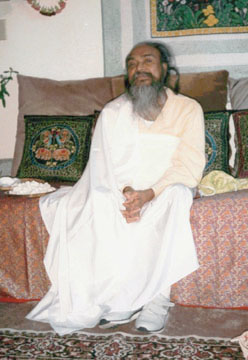![]()
HOME │ HIS LIFE │ MEDITATION │ PROGRAMS │ BHAVA │ EXPERIENCES │ YOGA VASISHTA │ BOOKSTORE │ PHOTOS│ VIDEO │ LIBRARY │ ARCHIVES
INDEX page │ PREVIOUS page │ NEXT page
 Successors
Successors
What’s the significance of a lineage with gurus? Nityananda, Muktananda, and Gurumayi talk about coming from some certain lineage, like we have families and generations . . .
[no translation] “He tells you that Muktananda and Gurumayi are only spiritual leaders. They are not yogis.”
But within yogis, do they have lineages? When one yogi dies and another one comes in, is that a part of a lineage?
[no translation] “He tells you that what you are asking about and what he has been talking about is different. You are asking about a spiritual leader and the continuation of his mission right down with another spiritual teacher, and after him another spiritual teacher. He is not talking about that. That has no relation with the connection that yogis have. The yogi himself has nothing to do with the spiritual leaders.”
So forget about Muktananda and Gurumayi, OK. Just yogis. Do they have lineages? Do they have lines of descent? Like in another words is there a particular yogi . . .
[no translation] “He says a yogi never starts a religion.”
So there is no lineage then. Say Narada to Jesus, or Hadiakhan Babaji to Lahiri Mahasaya.
[no translation] “He tells you that all the yogis belong to a single line. They are all the same. They are all connected together. It’s not that you have branches or anything like that.”
“He says he is asking you to read the histories of yogis and the histories of the spiritual leaders. You yourself will understand, he says.”
There were occasions when it was obvious that Shivabalayogi needed no translation, usually when he was very animated and intent upon getting his point across forcefully. This was one such occasion.
![]()
When Swamiji was very sick after 1991, a devotee visited the Bangalore ashram who had been initiated into tapas by Swamiji and completed twelve years of tapas. Swamiji publicly declared that this tapaswin had successfully completed tapas. This man met with Swamiji privately, and after he left, several of us went inside Swamiji’s room and were sitting with him.
Swamiji asked us whether we knew why the tapaswin had come. Swamiji answered his own question.
“He came to ask for Swamiji’s ashrams. He is a devotee who knows how to sit in tapas, so he could do tapas to help his guru. But instead of wanting to serve his guru, he wants to succeed him.”
![]()
Seenu, Swamiji’s devotee now known as Shivarudrabalayogi, tells this story. It involves Adinarayana, the Secretary of the Bangalore Trust for many years who served Swamiji very faithfully and was blessed to die from a heart attack at Swamiji’s feet.
Adinarayana noticed there was a Ramakrishna mission just down the street from the Dehradun ashram, so he went there to tell the people there that the nadis write that Shivabalayogi is an reincarnation of Ramakrishna and that Shivabalayogi was just down the street. He thought the Ramakrishna devotees should be interested in the reincarnation of their master, but they weren’t. Adinarayana returned to Swamiji disappointed. When he told Swamiji, Swamiji was angry.
“Why are you telling them this? It should be left to each devotee as to how they see Swamiji and what they believe. If Swamiji is famous, it is because he has done twelve years of tapas. Swamiji has never used Ramakrishna’s name to become famous.”
![]()
At about 9:30 to 10:00 on Monday morning the 28th [a few hours before he dropped his physical body], Swamiji had me and Ramdas each hold one of his hands. He pressed both hands as if telling us to be silent. Then he said, “From now onwards, Amma, I don’t need doctors. I can take care of my body myself. I’ll look after everything, I assure you. From now on, leave everything in my hands. I will take care of the mission.”
INDEX page │ PREVIOUS page │ NEXT page
 |
Divine Play: Shivabalayogi’s life and blessings, 290 pages and over a hundred photos. Generally available in bookstores and online. |
Swamiji’s Treasure: The most comprehensive collection of biography, experiences, conversations & photographs of Shivabalayogi. |
Tapas Shakti: Published at Swamiji’s request in India, January of 1992. Contains his biography, conversations & experiences. |